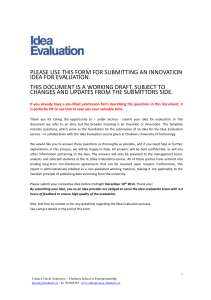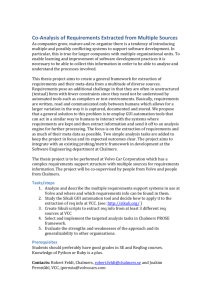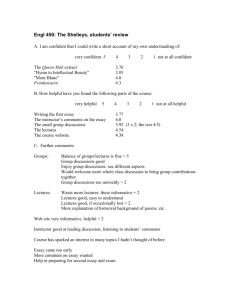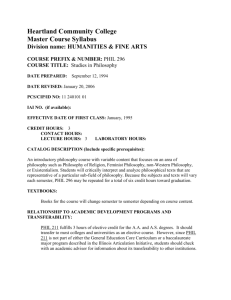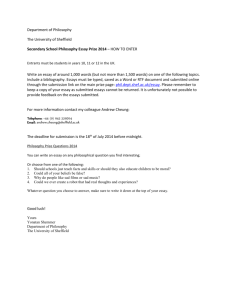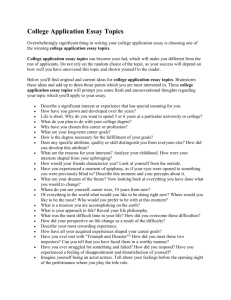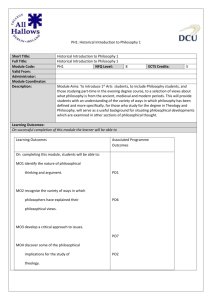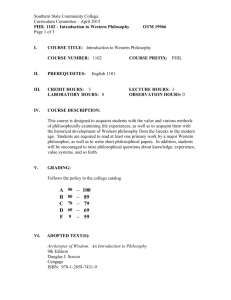Week 10 (Lectures 13-14): Internalism and
advertisement
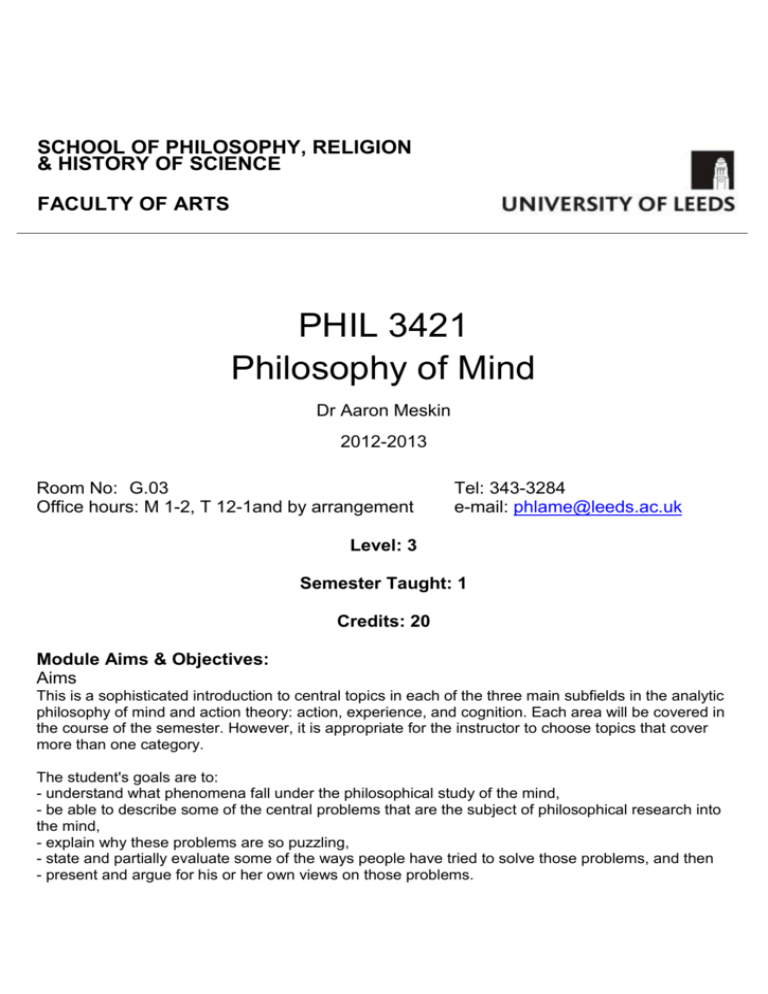
SCHOOL OF PHILOSOPHY, RELIGION & HISTORY OF SCIENCE FACULTY OF ARTS PHIL 3421 Philosophy of Mind Dr Aaron Meskin 2012-2013 Room No: G.03 Office hours: M 1-2, T 12-1and by arrangement Tel: 343-3284 e-mail: phlame@leeds.ac.uk Level: 3 Semester Taught: 1 Credits: 20 Module Aims & Objectives: Aims This is a sophisticated introduction to central topics in each of the three main subfields in the analytic philosophy of mind and action theory: action, experience, and cognition. Each area will be covered in the course of the semester. However, it is appropriate for the instructor to choose topics that cover more than one category. The student's goals are to: - understand what phenomena fall under the philosophical study of the mind, - be able to describe some of the central problems that are the subject of philosophical research into the mind, - explain why these problems are so puzzling, - state and partially evaluate some of the ways people have tried to solve those problems, and then - present and argue for his or her own views on those problems. PHIL 3421, Philosophy of Mind 2012-2013 Objectives On completion of this module, students should be able to: 1. display in oral and written form knowledge and understanding of some central theories, disagreements, problems, and arguments of several module topics; 2. read and analyse complex texts and be sensitive to issues of interpretation; 3. use a variety of philosophical techniques (example, description, argument) in written communication; 4. engage in philosophical theorizing, analysis, and evaluation. In addition, they should: 5. have some first-hand experience of the writings of some major philosophers on the module topics; 6. be aware of the frontiers of current debate and research on the module topics. Teaching Methods: 16 lectures and 4 seminars You can view all of your lecture and seminar times and locations on your personal timetable, which can be accessed via the Student Portal. You should check your timetable regularly throughout the term in case of any location changes. Required Materials: David Chalmers (ed.) Philosophy of mind : classical and contemporary readings Attendance: Attendance at lectures and seminars for this module is compulsory. Please see the School Undergraduate Handbook (available in the VLE) for full details of School regulations on attendance. Private Study: Independent Online Learning Private Study 180.00 Total contact hours: Total hours: (100 hrs per 10 credits): 200.00 Assessment: ASSESSMENT Assessment is by mid-term essay and final exam. Each assessment counts for 50% of your module mark. The mid-term essay: 2000 words (subject to a 10% allowance) You will choose one topic from a list of at least three. The essay must be typed. The final exam: 2 PHIL 3421, Philosophy of Mind 2012-2013 A 2 hour written exam during the January exams period It will consist of two essay questions (chosen from a list of at least three and no more than six). The essay and the final exam will be designed to assess: your comprehension of the course material, your ability to express ideas in a clear, concise manner (writing clarity), your ability to explain and defend your own views about it (engagement with the course material). Please see the School Undergraduate Handbook (available in the VLE) for full details of School assessment procedures including essay presentation and submission, word limits, deadlines, extension requests, examinations and resits. Guidelines on referencing and plagiarism can also be found in the Handbook. Essay Titles Essay titles will be distributed in Week 3 (i.e., the second week of lectures). You will have a selection of at least three topics to choose from. You are not allowed to submit the same work twice. You must ensure that your essay does not overlap extensively with work submitted for your dissertation, or for other modules within your subject or in related subjects. Feedback Arrangements: You will have numerous opportunities to receive feedback from the Module Leader and your fellow students throughout the semester. You will be required to turn in a rough draft of your essays and will receive guided feedback from fellow students on that. Comments on your essays will be returned by the Module Leader. Formal feedback on your final exam will be provided electronically once your marks have been released. Module Outline (subject to minor modification which will be announced in advance): Term Week 2 (Lectures 1 and 2): Cartesian dualism Descartes, Meditations on First Philosophy, meditations II and VI, in Chalmers, pp. 10-20 - available online at http://www.wright.edu/cola/descartes/mede.html Princess Elizabeth's letter to Descartes, May 1643 - available online at http://www.earlymoderntexts.com/descelis.html Letters written in 1643-4, p. 1 Ryle, 'Descartes' Myth', in Chalmers, pp. 32-8 - also published in Ryle, The concept of mind. London: Hutchinson, 1949. 3 PHIL 3421, Philosophy of Mind 2012-2013 Week 3 (Lectures 3 and 4): Behaviourism Putnam, 'Brains and Behavior', in Chalmers, pp. 45-54 - also published in Analytical Philosophy, ed. Butler. Blackwell, 1968. Week 4 (Lectures 5 and 6): The mind/brain identity theory Place, 'Is Consciousness a Brain Process? ', in Chalmers, pp. 55-9 - also available online: British journal of psychology , Vol. 47 (1956) Smart, 'Sensations and Brain Processes', in Chalmers, pp. 60-7 - also available online: Philosophical review, Vol. 68 (1959) Kripke, excerpt from Naming and Necessity, in Chalmers, pp. 329-33 - also published in Naming and necessity. Harvard University Press, 1980 Weeks 5 and 6 (No Lectures): Reading and Essay Preparation Week 7 (Lectures 7 and 8): Functionalism Putnam, 'The Nature of Mental States', in Chalmers, pp. 73-9 - also published as ‘Psychological Predicates’ in Art, mind, and religion : proceedings of the 1965 Oberlin Colloquium in Philosophy, eds. Capitan and Merrill, Pittsburgh: University of Pittsburgh Press, 1967. Armstrong, 'The Causal Theory of the Mind', in Chalmers, pp. 80-7 - also published in Armstrong, The nature of mind, and other essays, Ithaca, NY: Cornell University Press, 1981. Block, 'Troubles with Functionalism' (excerpt), in Chalmers, pp. 94-8 - also published in Readings in philosophy of psychology, ed. Block, Cambridge, MA: Harvard University Press. Week 8 (Lectures 9 and 10): Mental causation Kim, 'The Many Problems of Mental Causation'(excerpt, in Chalmers, pp. 170-8 - also published in Mind in a physical world : an essay on the mind-body problem and mental causation (Ch. 2), Cambridge, MA: MIT Press, 2000. Yablo, 'Mental Causation', in Chalmers, pp. 179-196 - also published in Philosophical review, Vol. 101 (1992) Week 9 (Lectures 11 and 12): Intentionality Brentano, 'The Distinction between Mental and Physical Phenomena', in Chalmers, pp. 479-484. 4 PHIL 3421, Philosophy of Mind 2012-2013 Chisholm, 'Intentional Inexistence', in Chalmers, pp. 484-491. Dretske, 'A Recipe for Thought', in Chalmers, pp. 491-499. Millikan, 'Biosemantics', in Chalmers, pp. 500-509. Week 10 (Lectures 13-14): Internalism and Externalism Putnam, 'The Meaning of Meaning', in Chalmers, pp. 581-596. Burge, 'Individualism and the Mental', in Chalmers pp. 597-607. Week 11 (Lectures 15-16): Internalism and Externalism Clark and Chalmers, 'The Extended Mind', in Chalmers, pp. 643-651. Rupert, ‘Challenges to the Hypothesis of Extended Cognition’, in Journal of Philosophy 101 (August, 2004): 389-428. Resources & Reading List: Getting Help: Key Documents Please ensure that you read and familiarize yourself with the following important documents, all available in the VLE: School of Philosophy, Religion & History of Science Undergraduate Student Handbook School Code of Practice on Assessment School Plagiarism & Referencing Guide School Style Guide Module Leader If you have queries not covered in the above key documents or in this Module Handbook, please contact the Module Leader during their office hours or by email. Student Staff Forum 5 PHIL 3421, Philosophy of Mind 2012-2013 You should always contact the Module Leader in the first instance about any problems which arise in relation to a module. Any unresolved concerns about a module can be directed to the student representative for the module. Module Representatives will be elected during an initial lecture and will make themselves known during the semester. Concerns about your programme of study or the School in general can be directed to the student representative for the programme. Programme representatives organize meetings of Module Representatives, and attend Staff Student Forum meetings, twice per semester. You can find out who your Programme Representatives are, and how to contact them, by checking the Portal under the ‘My Studies’ tab in the top left of the screen. If you are interested in becoming a Module Representative in the current academic year, please contact the Module Leader. If you are interested in becoming a Programme Representative next academic year, please look out for details of the application process which will be publicized towards the end of Semester 2. The School values student input very highly. 6

